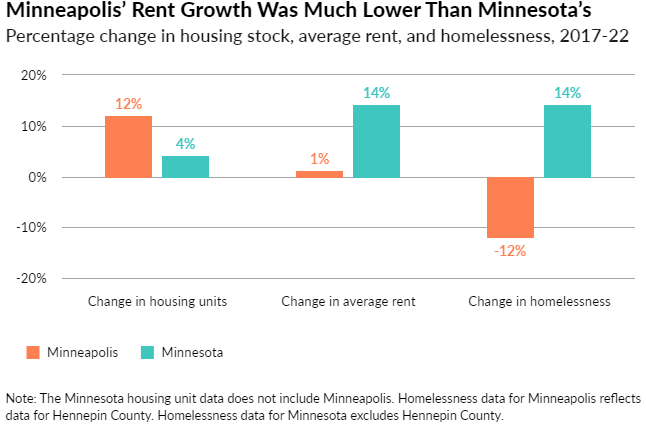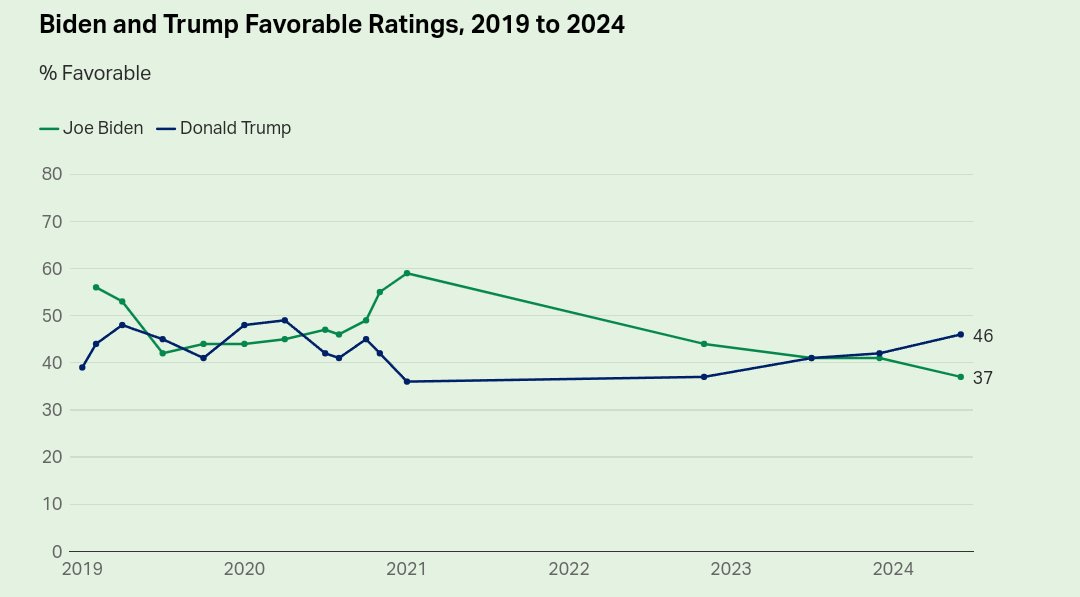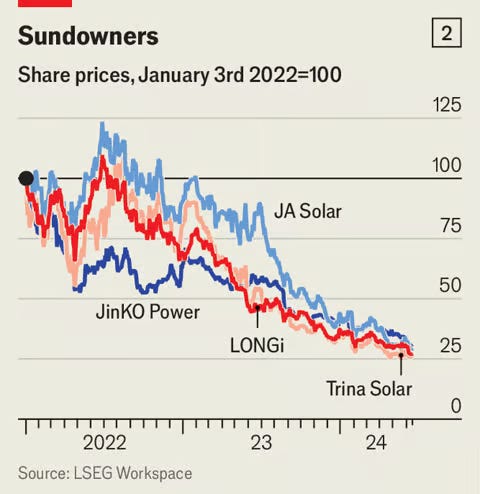Trumpdate (6.28.24):
EXECUTIVE SUMMARY:
NEWS NEWS
Presidential Debate: Poor moderation failed to challenge falsehoods. Overall, seen as Biden's worst campaign day, raising concerns about his fitness for office.
SCOTUS Rulings: Several key rulings: Blocked EPA's emissions rule, limited SEC's use of administrative judges, temporarily allowed emergency abortions in Idaho, and rejected Purdue Pharma's OxyContin settlement. Term extended into July.
NOT NEWS NEWS
Trump Hotel: New Trump International Hotel in Oman financed by Middle Eastern governments, raising significant conflict of interest concerns.
Housing Crisis: Communities with strict zoning laws face higher housing costs, rent growth, and homelessness rates. Minneapolis vs. Minnesota comparison illustrates the impact.
Election Models: Multiple quantitative models heavily favor Trump for 2024, with probabilities ranging from 49% to 71%. Biden's favorability reaches new low.
China Solar: Industry showing signs of trouble with falling export revenues and plummeting stock prices.
Trans Research: Emails reveal WPATH potentially interfered with Johns Hopkins University's systematic review of gender medicine, raising questions about research integrity.
1.) BIDEN VS TRUMP - DEBATE #1
[TS] Honestly, no real highlights from either side. This might have been the worst presidential debate on style and substance in the history of our nation tonight.
In first half-hour of debate, a raspy Biden delivers rambling answers while Trump counters with energy and falsehoods.
Here’s my take:
The lack of challenges from the moderators (if you can call them that) has the effect of making it appear that the torrent of lies flowing from Trump are on the same plane as the wonky-facts spoken softly from Biden.
If you’re looking for a moderator - Kyle Clark from Colorado.
Reminder: Former Chief of Staff John Kelly confirmed to *Jake Tapper* that Trump disparaged war dead - pretty impressive for Trump to deny it as Tapper moderates…also sad that Tapper said nothing.
This was the worst day for Biden of the campaign by a long margin.
Trump’s team won’t be celebrating Trump’s performance. They’ll be celebrating Biden’s.
At this stage, Biden did not do enough to rebut anyone concerned with his fitness. It would not be unreasonable for a person to watch this and think that Biden doesn’t have the tread left for 4 more years.
I think this debate did a good job shining the light on the failures of our media.
2.) SCOTUS Opinions - looks like the Court will not finish this term tomorrow but will go over into next week.
[CONTEXT]
It is relatively rare for the Supreme Court’s term to extend into July, but it does happen occasionally. The last time it happened was the 2020-2021 term (for obvious COVID reasons).
[TS] I don’t know enough about the court to have a strong opinion on this, but this captures my feelings per Rachel Cohen:
There's just no need for Supreme Court decisions to be on this suspense-driven whats-it-gonna-be secret calendar, they could just set a decision release schedule and meet their public deadlines like normal people.
A.) Ohio vs EPA: Supreme Court Block’s EPA’s ‘Good Neighbor’ Ozone Emissions Rule.
5-4 with Barrett joining the liberals in dissent.
What does this mean?
The EPA had administered stringent new emissions requirements on power plants and pipelines in parts of the country to stem ozone pollution that wanders into downwind states. The court ruled against the EPA’s rule aimed at reducing cross-state air pollution, stating that the rule overstepped the agency’s authority under the Clean Air Act. Overall, this reduces/undermines the federal government’s power to protect the environment/consumers.
[TS] That’s two blows against the essential regulatory power of the executive branch.
As an aside, Justice Gorsuch's opinion refers five times to "nitrous oxide" (aka laughing gas) rather than the entirely different chemical compound -- smog-causing "nitrogen oxides" -- actually at issue in the case. Prob not the best foot forward for a “Court knows best” argument.
B.) SEC vs Jarkesy: Supreme Court Rules Against SEC’s Use of Administrative Law Judges (ALJs).
6-3 along party lines.
The Supreme Court ruled that the SEC’s practice of using ALJs to adjudicate enforcement actions is unconstitutional. This decision emphasizes that cases involving significant monetary penalties should be heard in federal district courts, ensuring a right to a jury trial. The ruling challenges the SEC’s authority to choose between administrative proceedings and court cases, requiring a more transparent and constitutionally sound process
What does this mean?
[TS] Basically to impose civil penalties (essentially, fines) the agencies now have to invite everybody to a full trial. Sounds technical, but it’s huge.
Opponent view per Mark Stern:
SCOTUS' decision is Jarkesy may well hobble many federal agencies' ability to bring meaningful enforcement actions against wrongdoers. Not just the SEC. Neither the executive branch nor the judiciary have the time or resources to try all these cases before a jury. Nowhere close.
Today's decision in Jarkesy could kneecap enforcement by the FCC, the FTC, the NLRB, the Department of Labor, and more—it goes WAY beyond the SEC. This is a massive blow to the federal government's ability to enforce regulations against lawbreakers.
Congress would have to give a bunch of federal agencies VASTLY more money and personnel to handle all the jury trials they would need to conduct to patch the hole that SCOTUS just blew in their enforcement powers. It won't happen. This case will just let lawbreakers off the hook.
For those keeping score, this decision strikes out ANOTHER provision of the Dodd–Frank Act, which finally let the SEC impose civil penalties in administrative law proceedings. This Supreme Court really hates Dodd–Frank!
Proponent view:
It reinforces the separation of powers by preventing the SEC from being both prosecutor and judge, ensuring fairness and due process by upholding the right to a jury trial. The decision also addresses the non-delegation doctrine, requiring clear guidelines from Congress to prevent unchecked agency discretion. Lastly, it emphasizes the need for executive oversight and accountability within the administrative state. This decision enhances the transparency, fairness, and constitutional integrity of the enforcement process.
C.) Moyle v. US (aka EMTALA case): Supreme Court Allows Emergency Abortions in Idaho (for now).
5-4 Dismissed as improvidently granted (DIG), per curiam (which means unsigned).
The court indicated that doctors in Idaho can perform emergency abortions without violating state law, affirming that the federal Emergency Medical Treatment and Labor Act (EMTALA) requires providing necessary stabilizing treatment, including abortions, in emergencies. This decision overrides Idaho’s stringent abortion restrictions, ensuring that emergency medical care, including abortions, can be legally provided to save the life or health of the mother.
What do you mean, “for now?”
The dismissal allows the case to return to lower courts for further proceedings.
D.) Harrington v. Purdue Pharma: Supreme Court blocks OxyContin bankruptcy plan
5-4
The justices threw out Purdue Pharma’s $ 6 billion bankruptcy plan on Thursday over a provision that would have released the Sackler family from liability. The Sacklers own the company, which made and aggressively marketed the opioid OxyContin, but did not themselves file for bankruptcy. The court ruled that the bankruptcy code does not allow for such a third-party release without the consent of creditors and victims.
[TS] That’s all for Thursday.
Here’s what’s left:
Trump immunity
J6 obstruction
Chevron
Social media
Regulatory limitations period
[TS] Trump immunity will likely be last (if at all) for the term.
QUICK BITES:
Special counsel just provided Judge Cannon with all the examples of how dangerous Trump’s rhetoric is in support of his motion to modify the bail conditions. 4 pages of examples.
Tax Foundation: "We estimate [Trump's] proposed tariffs would reduce long-run GDP by 0.8 percent, the capital stock by 0.7 percent, and hours worked by 684,000 full-time equivalent jobs."
3.) Trump Jr. reveals a new project: Trump International Hotel in AIDA, Oman.
[TS] This is being financed by foreign governments in the Middle East. How is this not a massive conflict of interest?
[CONTEXT]
Since Watergate, it’s been common for presidents to place their assets in a blind trust or take other steps to avoid conflicts of interest. For example, Jimmy Carter placed his peanut farm in a blind trust, and GW Bush and Obama took similar steps to distance themselves from their personal financial interests.
Trump did not place his assets in a blind trust. Instead, he transferred control of Trump Org to his sons (Jr & Eric) but he retained ownership and was regularly briefed on the company’s financial performance. He is the first modern president to disregard these norms (similar to releasing his taxes).
4.) [TS] Continuing the theme of: If you don’t build houses…
Communities with strict zoning rules—such as excessive parking requirements—tend to have higher:
Housing costs
Rent growth
Levels of homelessness
If we look at Minneapolis vs Minnesota we can see the difference and the downstream effects:
5.) Quantitative Models of the Presidential Race (so far):
FiveThirtyEight: Trump 49%
JHK: Trump 63%
Nate Silver: Trump 66%
The Economist: Trump 71%
[TS] Not a rosy picture for Democrats.
[RELATED]
[TS] Not to pile on, but Gallup Poll favorability ratings shows Biden at Net: -24 for a new low. Trump was net -6 (highest since Apr 2020).
6.) FP’s Agathe Demarais: China’s solar industry showing signs of trouble
A few recent events:
Drop in prices caused Chinese solar export revenues to fall by 5.6% in 2023, even as volumes soared
Share price of many Chinese solar companies have lost ~75% of their value since 2022
7.) ECONOMIST: Research into trans medicine has been manipulated
Emails Reveal WPATH Interference in JHU Gender Medicine Review
Emails released during discovery in a youth gender medicine case reveal that the World Professional Association for Transgender Health (WPATH) interfered with systematic reviews commissioned from Johns Hopkins University (JHU).
• Damning Emails: WPATH sought to control the output of the JHU team, which was paid $200k to examine transgender healthcare questions as the Standards of Care 8 were developed.
• Explicit Quotes: Karen Robinson, head of the JHU effort, stated, “Hopkins as an academic institution, and I as a faculty member therein, will not sign something that limits academic freedom in this manner.” Robinson consistently pushed back against WPATH’s attempts to interfere.
• Contract Terms: WPATH signed a contract giving it review/feedback rights but no real power to interfere. Despite this, after Robinson’s team submitted two manuscripts in July 2020, WPATH expressed numerous “concerns.”
• New Policy Issue: WPATH claimed JHU hadn’t followed a new policy requiring study design and results to be submitted for WPATH’s approval before completion, undermining the systematic review’s purpose and integrity. Robinson noted this violated academic freedom and independence principles.
• Evidence of Interference: A checklist indicated a WPATH team member was involved in the design, drafting, and final approval of a paper published after the new policy. The paper itself claimed the opposite.
• Corrupted Process: The evidence suggests a corrupted evidence-gathering process. A fall 2020 email from then-incoming WPATH president Walter Bouman stated research must be “thoroughly scrutinized and reviewed to ensure that publication does not negatively affect the provision of transgender health care in the broadest sense.”







